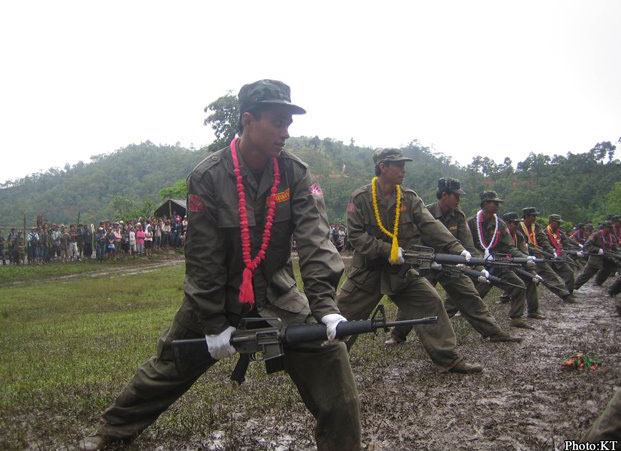During the first week in March, the Karenni Nationalities Progressive Party (KNPP) will meet with the government peacemaking team to talk about a cease-fire. If successful, a political dialogue will follow.

KNPP Secretary 1 Khu Oo Reh said the government and KNPP peace delegations would meet again at Loikaw in Karenni State to talk about defining the control areas, liaison offices and the basic needs of Karenni troops.
“As a first step, both sides will exchange information about their troops,” Khu Oo Reh said. “Especially, we will talk about our troop locations and control areas.”
In early February, a peace delegation led by Rail Transportation Minister Aung Min and KNPP leaders met in Chiang Mai in northern Thailand and agreed to meet again in the first week of March.
On February 16, Minister Aung Min told Reuters news agency that the KNPP would sign a deal on March 1.
“Aung Min said that, but we think that he trumped it up because the [Burmese] government wants international countries and organizations to think their efforts are fruitful. He’s just trying to get credit. In our first meeting with them, they did not fix a date. He told them that without informing us,” Khu Oo Reh said.
The KNPP will also discuss future business deals and development projects in Karenni State and the plight of up to 150,000 Karenni war refugees who want to return to their homes and find productive work. Karenni refugees began leaving the state in the 1990s. Many found refuge at two camps in Mae Hong Son Province in Thailand. Khu Oo Reh said that since February 20, KNPP leaders have provided refugees with counseling related to returning to Burma.
“We gave refugees advice, including not to return home until there are reliable guarantees. The leaders explained that they don’t know if peace talk would be fruitful or not. And there are still landmines planted by both sides in the area,” he said.
In the meeting held at Chiang Mai, the KNPP urged the government to stop confiscating farmland in Karenni State and to suspend dam building without residents’ consent as conditions before a political dialogue can begin.
The KNPP was formed in 1957 as the political wing of the Karenni Army. It is the only armed Karenni group that still fights against the Burmese government. Many of its Karenni fellow groups including the Karenni Nationalities People’s Liberation Front and the Karenni National Defence Army have become members of the government’s Border Guard Force, and are now under government control.
When Burma gained independence from Britain in 1948, Karenni State was included in Burma’s territory, but the armed groups rejected the inclusion. On August 9, 1948, during the government of Prime Minister U Nu, troops attacked the main office of the Karenni National Organization, which triggered the Karenni revolution.


